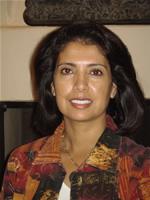Colour Me Muslim: An American Mother
Susan notes: This guest post is by Karachi-born Muslim American Author Dilara Hafiz. She holds degrees from John Hopkins University and the London School of Economics. She has drawn upon her years of teaching weekend Islamic school, lecturing about Islam, and raising Muslim teenagers to contribute to The American Muslim Teenager’s Handbook which she co-wrote with her daughter Yasmine and her son Imran. The opinions expressed in the post are those of the author, and not necessarily mine or those of Amazing Woman Rock.
 “I think I’m a Muslim…but I’m not sure.”
“I think I’m a Muslim…but I’m not sure.”
Hearing those words uttered hesitantly by a vulnerable-looking teenager one day after I finished a presentation on Islam at the local high school only strengthened my resolve to continue raising my two children as Muslims, regardless of the post-9/11 environment.
Too many kids were falling by the wayside due to insecurities, lack of knowledge, and the overwhelmingly negative connotations associated with Islam.
As a teacher at my local weekend Islamic school, a speaker for the Islamic Speakers Bureau of Arizona, and most important, as the parent of two American Muslim children, I knew that I could not give up.
I don’t claim to have all the answers, but what I do know comes from a few intense years of increased public outreach as a Muslim board member of the Arizona Interfaith Movement and as the co-author of ‘The American Muslim Teenager’s Handbook ’
The most visible means was our book. We researched in 2002, wrote in 2003-2005, edited in 2005, then self-published in 2006-2007. After a modest 3,000 copies sold in the first six months, an interview in the New York Times catapulted us to the professional world of Simon & Schuster Publishers and a second edition release of 25,000 copies in 2009!
We gave over 165 interviews and presentations in a two-year period. These experiences solidified a strong sense of identity in us all, but especially my two children. Although they are now both attending colleges far from home (Yasmine is a junior at Yale, while Imran is a freshman at Duke), they both continue to speak about Islam, their identity as American Muslims, and their passionate interfaith activism for the country that they call home, America.
As Imran likes to say, “People are not speaking from hate – they’re speaking from ignorance. Although I went to bed an American on 9/10 and woke up a Muslim on 9/11, I have to speak out to counter the ignorance.”
When people question my children’s credentials amd courage to write a book about Islam, my daughter replies, “I’m an expert on being an American-Muslim teenager. Who better to write a book on that subject?”
At school, we supported our children’s desire to join sports teams, drama clubs, and student council without hesitation. We never labeled activities ‘Islamic’ or ‘un-Islamic.” If you don’t want your kids to date, then lay down the house-rules without dragging religion into the equation. Hiding behind cultural customs which sometimes have little basis in Islam is tempting, but it only perpetuates the myths surrounding Islam.
I learned that some of the key things a Muslim parent should do (in fact, that any parent should do), is to engage in their children’s lives, keep the lines of communication open, and accept the gray areas which will require constant negotiation during the teen years. While it’s easy to live a life in black and white, color is so much more beautiful.
This guest post is by Karachi-born Muslim American Author Dilara Hafiz. She holds degrees from John Hopkins University and the London School of Economics. She has drawn upon her years of teaching weekend Islamic school, lecturing about Islam, and raising Muslim teenagers to contribute to The American Muslim Teenager’s Handbook which she co-wrote with her daughter Yasmine and her son Imran. She contributes to the Huffington Post and various other publications.
Related links:
The American Muslim Teenager's Handbook
To Mosque Or Not To Mosque
More About Islam on AWR